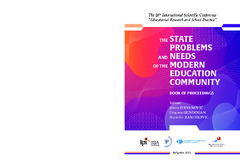Приказ основних података о документу
Predictors of pro-environmental behavior – the results of a pilot study on environmental literacy
| dc.contributor | Stevanović, Jelena | |
| dc.contributor | Gundogan, Dragana | |
| dc.contributor | Ranđelović, Branislav | |
| dc.creator | Marušić Jablanović, Milica | |
| dc.creator | Stanišić, Jelena | |
| dc.creator | Savić, Savić | |
| dc.date.accessioned | 2023-03-15T09:55:13Z | |
| dc.date.available | 2023-03-15T09:55:13Z | |
| dc.date.issued | 2022 | |
| dc.identifier.isbn | 978-86-7447-161-6 | |
| dc.identifier.uri | http://ipir.ipisr.org.rs/handle/123456789/921 | |
| dc.description.abstract | The role of contemporary education is to prepare children and youth for life after school by helping them acquire knowledge and develop skills and attitudes, thus endowing them with certain competencies. One of the key characteristics of contemporary competencies is interdisciplinarity, that is, extension beyond the framework of traditional school subjects, whereby children acquire knowledge that allows them to actively fulfill their civic roles. Inter-subject competencies as defined by the Law on Primary Education and Upbringing in Serbia include a responsible attitude towards the environment (Law on Primary Education and Upbringing, 2021). Therefore, responsible environmental behavior is one of the desired outcomes of the process of education. Likewise, it is an indicator of the wider construct referred to in the literature as environmental literacy. Thomas Marcinkowski (1991) defines environmental literacy as an awareness and sensitivity towards the environment, an attitude of respect for the natural environment and concern for nature and human impact on it, the knowledge and understanding of the functioning of natural systems and human impact on them, the understanding of environmental issues across multiple scales, from local to global, skills required to analyze, synthesize, and evaluate environmental issues, a sense of personal investment and responsibility as well as motivation to work towards the resolution of environmental issues, the knowledge of the available strategies for solving environmental issues, skills required for the development and implementation of such strategies, and finally, active involvement in the resolution of environmental issues. | sr |
| dc.language.iso | en | sr |
| dc.publisher | Belgrade : Institute for Educational Research | sr |
| dc.relation | info:eu-repo/grantAgreement/MESTD/inst-2020/200018/RS// | sr |
| dc.rights | openAccess | sr |
| dc.source | The state, problems, and needs of the modern education community | sr |
| dc.subject | environmental literacy | sr |
| dc.subject | ecological knowledge | sr |
| dc.subject | affect | sr |
| dc.subject | cognitive skills | sr |
| dc.subject | proenvironmental behavior | sr |
| dc.title | Predictors of pro-environmental behavior – the results of a pilot study on environmental literacy | sr |
| dc.type | conferenceObject | sr |
| dc.rights.license | ARR | sr |
| dc.citation.epage | 113 | |
| dc.citation.spage | 106 | |
| dc.description.other | Book of proceedings: 28th International Scientific Conference “Educational Research and School Practice”, December 9th , 2022 Belgrade” | sr |
| dc.description.other | Book of proceedings is available online: [https://www.ipisr.org.rs/images/naucni-skupovi/book-of-proceedings.pdf] | |
| dc.identifier.fulltext | http://ipir.ipisr.org.rs/bitstream/id/2879/Predictors_of_pro_environmental_behavior_the_results_of_a_pilot_study_on_environmental_literacy_2022.pdf | |
| dc.identifier.rcub | https://hdl.handle.net/21.15107/rcub_ipir_921 | |
| dc.type.version | publishedVersion | sr |

